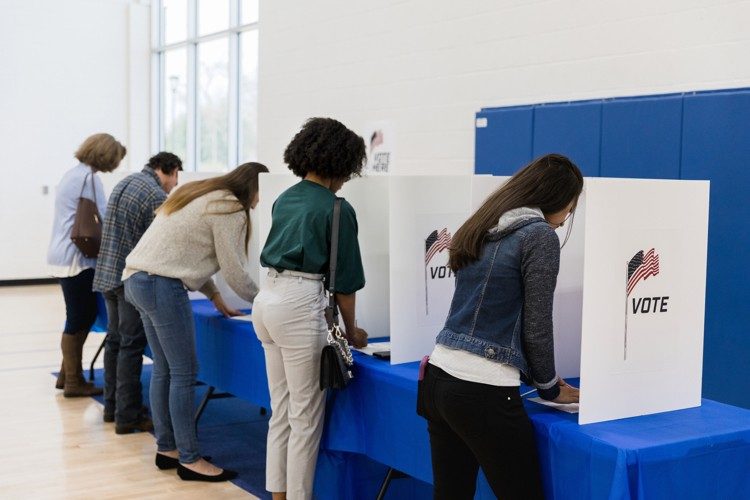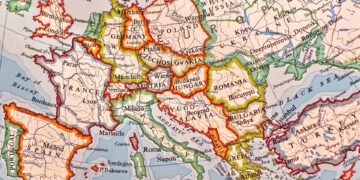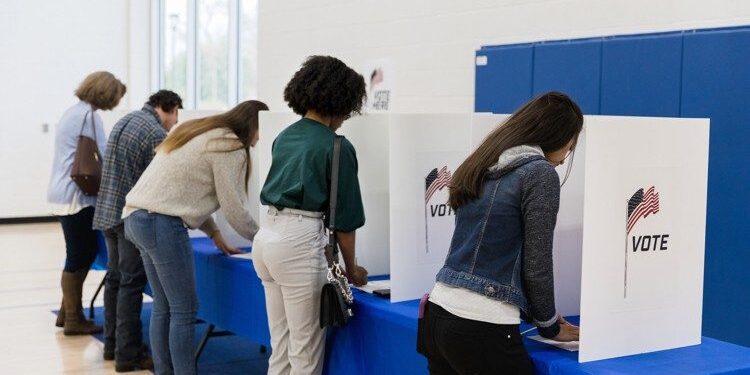
Six states and the District of Columbia will hold ballot measures on ranked-choice voting (RCV) during the elections on November 5. RCV threatens election integrity and undermines the electorate’s ability to choose the best candidate in elections.
Implementing RCV
The Left and some establishment Republicans are attempting to implement RCV — also called instant runoff voting (IRV) — in each state and locality, and the following ballot measures are the latest example of this.
Colorado: Proposition 131, if passed, would implement top-four RCV for all federal and state elections in Colorado. Under this system, the top four candidates in a “jungle primary” election (i.e., candidates of every party are on the same ballot) advance to the general election. The winner is then chosen via RCV. Unlike most states, which allow ballot measures to pass with a simple majority, Colorado requires them to get a 55-percent supermajority to pass.
Idaho: Proposition 1 would implement top-four RCV for federal, state, and county elections in Idaho. It would also repeal House Bill 179 (H.179), enacted by the Idaho Legislature in 2023. H.179 banned ranked-choice voting (RCV) in the state.
Nevada: Question 3 would implement top-five RCV for federal and state elections. In 2022, Nevada voters approved the same referendum by a 53-47-percent margin, but as a legislative-initiated constitutional amendment, a second vote must be held for it to be formally adopted.
Oregon: Measure 117 would implement RCV for primary and general elections for federal and state executive officials.
Washington, D.C.: Initiative 83 would implement RCV and partially implement open primaries.
Repealing RCV
Meanwhile, two states are holding ballot measures to repeal or prohibit RCV.
Alaska: Ballot Measure 2 would abolish RCV, which Alaska voters adopted in 2020, restoring the pre-RCV election system in the state.
Missouri: Amendment 7 would constitutionally prohibit RCV while making unrelated election changes, such as requiring U.S. citizenship to vote.
Problems With RCV
Ranked-choice voting undermines election integrity and is antithetical to traditional American election procedures. The May 10, 2021 issue of The New American magazine explains how RCV works and why it would harm U.S. elections:
[It] is a complicated system that requires voters to assign a rank to each candidate on the ballot, regardless of whether they support that candidate. If no candidate is ranked first by a majority of voters, the lowest-performing candidate is eliminated. Voters who gave their highest ranking to the eliminated candidate then have their second choice counted instead. This process repeats until one candidate receives a majority.As implied above, ranked-choice voting can lead to candidates with little genuine support winning elections. The system confuses voters, distracts from policy issues, and forces voters to vote for candidates they otherwise would not support. In the United States, ranked-choice voting was enacted in Maine in 2016 and Alaska in 2020. These efforts, primarily backed by liberals, led to Republican U.S. Representative from Maine Bruce Poliquin losing to Democrat Jared Golden in 2018 despite winning a plurality in the first round. Meanwhile, some political analysts believe that Alaska’s new system, which also eliminates party primaries, will enable liberal Republican Senator Lisa Murkowski’s reelection in 2022 despite her unpopularity among Republicans.
Sure enough, RCV allowed U.S. Senator Lisa Murkowski to win re-election to the U.S. Senate in 2022 against conservative Republican Kelly Tshibaka, despite Murkowski’s inability to win a Republican primary under a traditional election system.
In an August 29 op-ed, Idaho Republican Party Chairwoman Dorothy Moon explained the significance of Idaho’s upcoming RCV referendum:
Proposition 1, the Ranked Choice Voting initiative, presents the greatest threat to election integrity in Idaho since statehood. This expensive, complicated, and unnecessary scheme eliminates the time-tested “one person, one vote” method of electing candidates, replacing it with a new and confusing one that is hard to count and even harder to audit after the fact.
With any voting system, the more complicated it is, the greater the risk of manipulation strategies or fraud. Additionally, RCV would make hand counts much more difficult, creating an excuse for computerized vote counting. By contrast, genuine election integrity must involve hand-counted paper ballots.
RCV has multiple other problems. For example, if the two lowest-performing candidates are tied, a winner cannot be determined under this system.
Dangers of Direct Democracy
Not only is RCV antithetical to the American form of government, but so is the method states are using to implement it. Statewide referendums inherently contradict America’s republican form of government. In addition to being a major step toward democracy — and away from a republican form of government — they make it easy to adopt radical and poorly thought measures that significantly grow the size and scope of government.
Furthermore, direct democracy usually empowers left-wing interests rather than ordinary citizens. An analysis of recent referendums reveals that leftist groups and donors have used them to enact radical policies, including legalized abortion, RCV, and Medicaid expansion.
Readers may find more information about the problems of direct democracy in the article “Restore State Government,” published in the October 14 issue of The New American magazine.
In order to roll back RCV and other infringements on the American form of government, it’s essential that patriots work to build an educated and activated electorate and hold their elected officials accountable to the U.S. Constitution and principles of liberty.
To urge your state legislators to oppose ranked-choice voting, visit The John Birch Society’s legislative alert here. To sign up to receive legislative alerts via email or text message, click here.











































